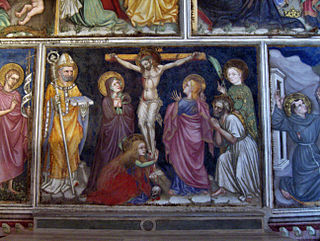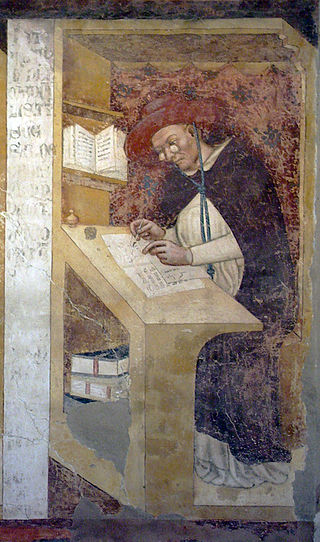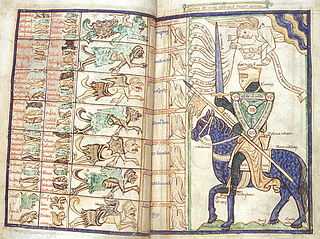This article needs additional citations for verification .(August 2020) |
Nicholas Bayard (fl. 1300?) was a Dominican theologian.
This article needs additional citations for verification .(August 2020) |
Nicholas Bayard (fl. 1300?) was a Dominican theologian.
Bayard was, according to Bale, a Dominican theologian at Oxford, where he obtained his doctor's degree.
Pits's account tends in the same direction, and both biographers praise their author for his knowledge of pontifical law. Bale adds that he was very skilled for his age in Aristotelian studies, but accuses him of distorting the Scriptures by "allegorical inventions and leisurely quibbles."
Bayard's principal work appears to have been entitled "Distinctiones Theologiæ," and, according to the last-mentioned authority, this book was largely calculated to corrupt the simplicity of the true faith, as it consisted, like Abelard's "Sic et Non," of an assortment of theological opinions opposed to one another. A manuscript of this work is still preserved in Merton College library, and Tanner gives a list of other writings of this author that are to be found in English libraries.
The date assigned to Nicholas Bayard by his English biographers is about 1410; but this can hardly be correct if Mr. Coxe is right in assigning the handwriting of the Merton manuscript to the previous century. The whole question of the era in which this writer lived, and his nationality, is minutely discussed by Quétif in his "Scriptores Ordinis Prædicatorum," who inclines to believe that Bayard was a Frenchman of the thirteenth century. This, according to Quétif, is the opinion of an ancient French writer, Bernard Guido. Quétif also shows how, in the collections of that age, preserved up to his days in the Sorbonne, Bayard's sermons constantly occurred in company with those of William of Auvergne, bishop of Paris (1228–48), and other great characters of Louis IX's reign. More conclusive as to the date is Quétif's assertion that in the "Liber Rectoris Universitatis Parisiensis" Bayard's great work is mentioned as being for sale in Paris before the year 1303; that several other discourses of Bayard were for sale in Paris at the same time; and that his "Sermones Dominicales" formed part of a parchment folio in the Sorbonne library, containing Robert de Sorbonne's "Liber de Conscientiâ".
Quétif does not, however, adduce any indubitable evidence that Bayard was a Frenchman. But if he was the writer of the "Summa de Abstinentia," which Quétif unhesitatingly assigns to him, and does really, as Quétif asserts, mingle French words with the Latin text, the fact of his French residence, if not of his French birth, may perhaps be considered as proved. Lastly, as regards the order to which Bayard belonged, Quétif observes that there is no certain evidence whether he was a Franciscan or a Dominican. In all the manuscripts excepting one he appears to be called simply Frater Nicholas de Bayard, and in the only one which is more precise he is called a Minorite.
Only one of Bayard's works seems to have been printed, and that one of somewhat doubtful authenticity, the "Summa de Abstinentia," which was published under the title of "Dictionarius Pauperum" by John Knoblouch at Cologne in 1518, and again at Paris in 1530. A longer list of Bayard's works is given by Bale.

Alain de Lille was a French theologian and poet. He was born in Lille, some time before 1128. His exact date of death remains unclear as well, with most research pointing toward it being between 14 April 1202, and 5 April 1203. He is known for writing a number of works on that are based upon the teachings of the liberal arts, with one of his most renowned poems, De planctu Naturae, focusing on human nature in regard to sexual conduct. Although, Alain was widely known during his lifetime, there is not a great deal known about his personal life, with the majority of our knowledge of the theologian coming from the content of his works.

The College of Sorbonne was a theological college of the University of Paris, founded in 1253 by Robert de Sorbon (1201–1274), after whom it was named.

Jacobus de Voragine was an Italian chronicler and archbishop of Genoa. He was the author, or more accurately the compiler, of the Golden Legend, a collection of the legendary lives of the greater saints of the medieval church that was one of the most popular religious works of the Middle Ages.
This article contains information about the literary events and publications of the 13th century.

The Summa contra Gentiles is one of the best-known treatises by Thomas Aquinas, written as four books between 1259 and 1265.

Hugh of Saint-Cher, O.P. was a French Dominican friar who became a cardinal and noted biblical commentator.
Nicolas Ysambert was a French, Roman Catholic theologian, and lifelong teacher at the Sorbonne.

William Perault,, also spelled Perauld; Latinized Peraldus or Peraltus, was a Dominican writer and preacher.
A correctory is any of the text-forms of the Latin Vulgate resulting from the critical emendation as practised during the course of the thirteenth century.

Réginald Marie Garrigou-Lagrange was a French Dominican friar, philosopher and theologian. Garrigou-Lagrange was a neo-Thomist theologian, recognized along with Édouard Hugon and Martin Grabmann as distinguished theologians of the 20th century. As professor at the Pontifical University of Saint Thomas Aquinas, he taught dogmatic and spiritual theology in Rome from 1909 to 1959. There he wrote The Three Ages of the Interior Life in 1938.
Vincent Baron was a French Dominican theologian and preacher.
John of La Rochelle, was a French Franciscan and theologian.
Peter of Auvergne was a French philosopher and theologian.
Antoine Massoulié was a French Dominican theologian. He was uncompromising against Quietism, and Molinism.
Matthieu Ory was a French Dominican theologian and Inquisitor.
Catholic dogmatic theology can be defined as "a special branch of theology, the object of which is to present a scientific and connected view of the accepted doctrines of the Christian faith."
Jean Nicolaï was a French Dominican theologian and controversialist.
John Matthew Rispoli was a major Maltese philosopher of great erudition. He was held in high esteem by the Grand Masters of the Knights Hospitaller Order, the Bishops of Malta, the Viceroys of Sicily, cardinals, bishops, inquisitors, and the common people. Perhaps the most eminent Maltese philosopher of the Middle Ages, the various extant writings of his are witness to his philosophical aptitude and dexterity as to his high calibre as a philosopher. These qualities were highly appreciated during his lifetime, in Malta as in France and Italy. He lived a busy life, both as an intellectual and as an administrator. He was professor of philosopher at various institutions of high education, an able preacher, and an official at various posts within the Dominican Order, of which his was a member. He was an avid aficionado of music, and was talented with playing musical instruments. Though the fame of holiness accompanied him in his life, this did not deter the Inquisition from suspecting him of heresy, and keeping him in its dungeons for fourteen months. When he died, he was given an almost state funeral.
John of St. Giles was an English Dominican friar and physician.
Simon Henton or Heinton was a Dominican provincial in England and a biblical commentator. Most of his works are lost.
![]() This article incorporates text from a publication now in the public domain : Archer, Thomas Andrew (1885). "Bayard, Nicholas". In Stephen, Leslie (ed.). Dictionary of National Biography . Vol. 3. London: Smith, Elder & Co.
This article incorporates text from a publication now in the public domain : Archer, Thomas Andrew (1885). "Bayard, Nicholas". In Stephen, Leslie (ed.). Dictionary of National Biography . Vol. 3. London: Smith, Elder & Co.